(in ascending order, approximately)
Infinite Livez Vs Stade, Morgan Freeman's Psychedelic Semen
Almost makes it just purely for the title alone. Wazzy-to-the-maxxx glitch-meets-gibberish Dada-rap, just like the last one; cool, but I'd wouldn't mind if he reverted to Bush Meat song-like structuredness. Wouldn't mind at all.

Nico Muhly, Mothertongue
Profiled in the New Yorker recently, where the angle was "wow, a composer who's au fait with this crazy modern Web 2.0 world we live in". One scene depicted Muhly in his Chinatown apartment, composing on his laptop (wot, no parchment and quills?) in multi-task mode (stopping regularly to reply to emails pinging in the inbox, with two different IM conversations running, AND a couple of games of Scrabulous on the go). But the album is actually rather interesting, finding--or creating--a common ground between English church music of the 16th>17th Century and post-Reich/Glass/Nyman systems music. The result: at times oddly redolent of the Dirty Projectors at their most abstruse.

The Lexie Mountain Boys's Sacred Vacation (Car Park)
Quasi-tribal vocal chants reminiscent of Furious Pig, albeit reached via freekfolk than neo-postpunk obscurantism. Monkey chants transposed to Appalachia, kinda thing.

Crystal Castles , s/t
Minimal expectations here: thought they were vaguely nu-rave aligned but this sounds more like someone fanning the embers of electroclash. Surprisingly poignant at times, like the soul-pangs of a broken-hearted robot.

Benga, Diary of An Afro Warrior
Booka Shade, The Sun and the Neon Light

On one level, fine verging on excellent records, keeping your attention through variety and intelligence and all the myriad precision-tooled touches. Both in the end leave me a little cold, though. Could it be the commonality of sound-design that all post-2000electronic music pretty much has, but that dubstep and microhouse make an aesthetic out of? Or is it the way you find yourself constantly placed in the mode of spotting the allusion, the artful reworking… the Benga track that has a drastically processed 'Think' break in it, something that inevitably tantalises every ex-junglist's memory-flesh, or when Booka Shade use a bass sound that'll make you flash on "Voodoo"-era A Guy Called Gerald, or… It can be a bit wearisome after a while. Someone vastly younger than myself probably won't have any associations at all, may well just experience these sounds as fresh and exciting. And then someone slightly less (but still significantly) younger (ie. late twenties/early thirties: the prime demographic for both microhouse and dubstep, I suspect) probably finds these sensations vaguely empowering, this feeling of going into a listening mode of reference-location and sub-generic classification. Analogous perhaps to the power-knowledge buzz of being "cultured", except in this case you're subcultured. Plaisir, and plenty of it, then; little in the way of jouissance, at least for this listener.
Various, An England Story (Soul Jazz)
UK MCs from the early Eighties to the early Oughties, from fast chat to grime via UK dancehall and Britrap. Too much of the latter and awfully thin on the "garage rap", bouncing flow era (i.e. what spawned grime). But still overall a good thing and almost like the soundtrack to one of those great record-sleeve scan-caked genealogies of genres that Woebot would do.

Various, Funky Nassau: The Compass Point Story 1980-1986 (Strut)
Again, just like a Woebot post, except if he was doing this comp he'd have had a Wally Badarou track in there. But you can't really argue with a selection including Grace Jones, Tom Tom Club, Ian Dury, Lizzy Mercier Descloux, Bits & Pieces' version of "Don't Stop the Music" (not as godlike as the Yarborough and People's original but not far off). That Nightclubbing/Sly & Robbie & Compass session bods reggaematic funk sound still sounds surprisingly modern. (That's reminded me of a guy I met once in the late Eighties in the Melody Maker pub, who said he was really into the stuff we were doing at MM in terms of writing and ideas, but then after a bit revealed he didn't care for the music at all. Startled but recovering quickly, I asked what he was actually into, musically. He said, 'oh well, I'm still listening to Nightclubbing actually'. Now this was a good six or seven years after that record came out. But that was the ultimate for him; music could go no further--plus it was libidinally bound-up with the last time he'd been really excited by the music press, New Pop-era NME. I thought that was quite bizarre, to have kept up with the music-writing but not the actual music! It seemed arse about tit). There's some more info about the record and Compass Point here and pictures from that era here
Ming & Stout, A Taste of Wood (Crapping Clown)
One of innumerable strangely addictive recordings by the Micalef-like poet Sexton Ming, sometime collaborator with Billy Childish. Highlights: "I Wish I Was Eno" and the genuinely disturbing "Too Much Time" (complete lyric: "I want this day to be over/There's too much time"). I need to get the one with the boy-band manager satire "I Own Your Farts" and the parka-vespa crew baiting "Mod Wank".
Kemialliset Ystavat. s/t
Wazzy freekfolk. Quite different--goofy and manic--to the other bits 'n' bobs I heard by this lot, which generally conjured images of stoned pagan minstrels recorded outdoors with a single microphone as they sit strumming and ululating in a circle on some Finnish heath. Whereas this is very much a studio record, a lets-use-every-track-on-the-mixing-desk, caked-with-sound affair.

David Pritchard, Noctural Earthworm Stew/Bouillabaise nocturne aux vers de terre
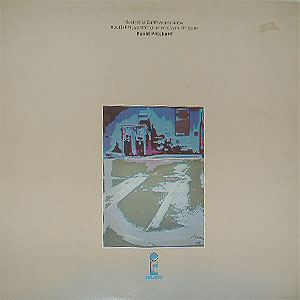
A real curio stumbled upon in my local used record store, grabbing my eye on account of the title and the fact it was on Island in 1976, yet I'd never heard of the artist. Turns out he was something like the Canadian David Vorhaus, or more like their one-man equivalent to the Radiophonic Workshop (interesting how so much of the post-War avant-garde was linked to national radio stations: WDR in Cologne; the Experimental Studio department of RTF in Paris; the Studio Fonologia Musicale of Radio Italiana in Milan). Pritchard did a freaky all-night radio show for CHUM-FM in Toronto in the late Sixties and early Seventies, then went on to found a long-running operation called Sonic Workshop doing adventurous audio projects for some 30 years. The release date--1976, that liminal year--is signficant: aspects of the music hark back to Eno, Faust, the pre-Autobahn Kraftwerk, Uncle Meat Zappa; other look forward to Cabaret Voltaire, TG's 20 Jazz Funk Greats, Der Plan. I wouldn't say this record is quite in either of those leagues; there's a whimsical/willfully wacky/messing-with-FX/ooh-look-at-all-my-synths (every piece of gear and every treatment used is itemized in classic Tomita style) that equally brings to mind Godley & Crème with their Gizmo or Peel Show quirksters like Morgan Fisher. Yet (like Radiophonic Workshop or much of the stuff on Daphne Oram's Oramics) there's that aspect where it's all the more enjoyable for being grounded in the pragmatic/mercenary, no-nonsense-yet-gimmicky-and-Goonsy world of radio and commercial jingles, radioplay Foleys and sound FX, interstitional muzik etc. mind you, the second side--"Nocturnal Earthworm Stew" itself--is actually a side-long opus/sound-suite intended as "an electronic rendering of the night"--which suggests a certain grand ambition.
Rings, Black Habit
I would have placed this a bit higher except my opinion--"first Great Record of 2008", adulatory review here--got dented slightly when, after playing it over and over again in the expectation that Joy would pipe up eventually with a "what a lovely record, who is it?" (her being such a Raincoats fan). I got instead "God that girl's voice is grating! let's have something else on now shall we?". Still think it's the missing link between Odyshape and the first Beat Happening LP, but I s'pose that could actually be wearing on the nerves.

Sally Shapiro, Remix Romance Vol 1. (Paperbag)
Usually this kind of affair is a pointless collection of insensitively mauled and maculate travesties, but this is a rare case of the complete opposite, maybe because the melodies and vocals are so untarnishably perfect they couldn't be ruined, or more likely they inspired love and respect and tender care on the part of those entrusted with reinterpreting them. Jon Brooks of Advisory Circle (see later) crops up with a nice retake of "Skating in the Moonshine", the Skatebard version of "He Keeps Me Alive" has a great chewy bassline, and Juan MacLean's reproduction of "I Know" earns him a writing co-credit and is so lovely I almost regret getting rid of his CD.

Cosmic Metal Mother "I Think"/Professor Genius "Pegaso" (Disque Sinthomme)
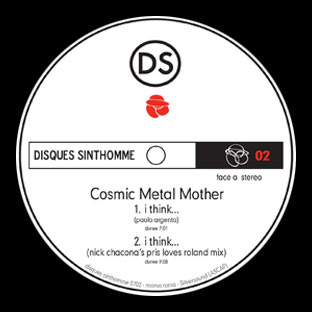
A little over a year ago I had this in-store epiphany at my local, hearing this ecstastically billowing kosmigroove soul-diva-sampladelicized instrumental and thinking it the most sublime thing I'd heard in a small aeon and asking the deejay only to find it was Jaydee's "Wont' Do". A similar thing happened a few weeks ago: rifling through 'new arrivals' and the deej (a different guy this time) plays another track that makes me swivel my head round and then go up to ask: a lovely dreamy analog-synthy hypno-rippler like the missing link between Klaus Schulze's Mirage and Larry Heard's "Beyond the Clouds". Well it turned out to be "I Think" by Cosmic Metal Mother, a group I still know nothing about on a label that eludes investigation. The other side, "Pegaso" is very nice too, but more in a electro-retro type vibe (think Solvent maybe). Hear them both here. (K-punk fans will note the record label's name for its neat pun on "synth" and "sinth")
Belong, Colorloss Record (St. Ives)
I've never been much of a one for looking at press releases but if I hadn't idly glanced at the photocopied one-sheet with this prerelease I'd honestly never have been able to tell just from listening that the second track on neo-shoegazers Belong's new EP is a cover of one of my absolute all-time favourite songs: "Beeside" by Tintern Abbey (the B-side to their more famous UK psych obscurity "Vacuum Cleaner"--both tracks can be found on one of those Bam Caruso freakbeat compilations). Listening again, there it was: a voice, blurred and buried and impossibly remote beneath a thousand miles of cascading reverberances, only-just-discernibly murmuring the eerie middle bit of the song: "she was a virgin of humble origin/she knew of no sin".
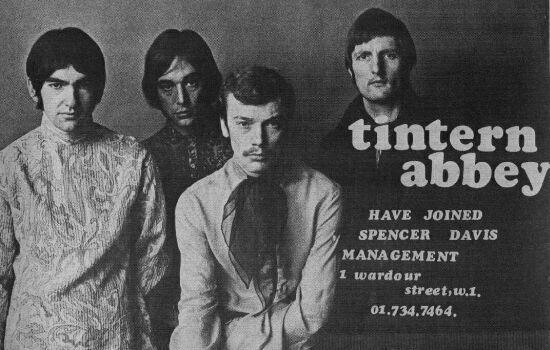
The other three songs on the EP are covers too: Syd Barrett's "Late Night" from The Madcap Laughs (but covered via the Cleaners from Venus's version, sez the press release! Has anyone ever done that before, covered a cover version, copied the non-original's arrangement and so forth?), plus songs by July and Billy Nichols, whoever they are. As a whole the EP sounds a bit like a Basic Channel/Chain Reaction record if they weren't hung up on the Belleville Three and Bullwackies but A.R. Kane's "Haunted" and Slowdive's Holding Our Breath EP. Not so much neo-shoegaze as ultra-shoegaze: the last track has an effect like myopia of the ears, with its vocal melody rippling and flickering across the surface of the sound like a human form mirrored in the vertical plane of a waterfall. Turk Dietrich of Belong tells me "we wanted the record to sound like it was recorded in the 1930's, or something to that effect, so that it would feel as if the music was coming out of a shortwave radio with an extreme lack of fidelity when listened to ........ like an apparition from the past but somehow distorted and not correct." I'd say they succeeded abundantly.
Ear Dis, "Hey Girl (T2 Remix) (Gusto)
Bassline house often has a rather 2D, flat and thin-toned sound appropriate to this digital age of people listening to music through computer speakers, iPods and cellphones. But this one is bassline at its most three-dimensionally sculpted and musical, with stomach-achy growls of bass, ace vocal science (unspooling coils of pitch-bent voice-goo) and great twitchy "string" parts continuing the grand UK garage tradition of quasi-classical arrangements (literalised by Imp Batch with that was-it-Prokofiev orchestral cut up tune of a few years back but going back at least as far as Genius Cru's "Boom Selection" if not the "strings of death" on "Bound 4 Da Reload"). T2's mix is the killer, but the mysterious JC's rmx and "JC Dub" are also good, and intriguingly difficult to place in the genrescape : definitely not bassline, surely not "funky", kinda sorta sounding a bit like the place where broken beat would meet 2step (except not really)… perhaps this one of those phantom genre-of-one type tunes that pop up and blink out. (2step and UKG 's always had loads of them, e.g., KMA's Recon Mission EP, or several things by New Horizons…

Nik Pascal The Complete Narco Records & Tapes Recordings
One of the best Creel Pones for a while. Lone analog dementia.
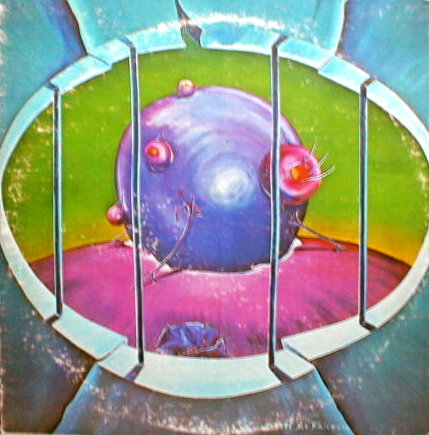
The Ting Tings, "Great DJ" and We Started Nothing
The missing link between LCD Soundsystem and Republica. And the best rock song about raving (and doing your first E?) since "Sons of the Stage" by this duo's same-neck-of-the-woods antecedents World of Twist.
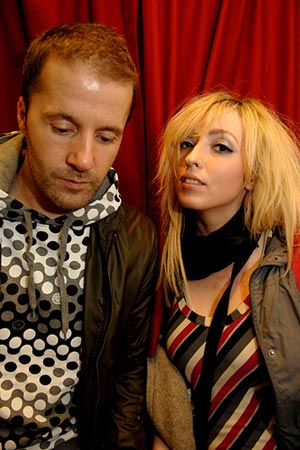
On a first listen (it's literally just arrived through the door) the debut album We Started Nothing doesn't appear to have anything quite as monstrously strong as "Great DJ", but some nifty tunes like "We Walk" nonetheless.
The Lines, Memory Span
Tasty anthology from Acute of a postpunk band I'm ashamed (all things considered!) I'd never heard of until Dan Selzer started going on about them. At first kinda like the Kinks meets 'Boys Don't Cry' era Cure, tuneful and crisp and spare; then later that skinny-verging-on translucent New Wave bop abruptly goes into the A Certain Ratio/Section 25 zone, with lithe funk bass and horns and uncanny hollows in the mix.
Various, Text-Sound Compositions - A Stockholm Festival(Fylkingen Records)
Several years back I speculated in these pages on the need for an "extremists of the human voice" box set, threw around some ideas for inclusions, canvassed for suggestions--but had no real inkling then what a vast area this is: abstract voice-work. There's the studio/concrete end of things, because--along with the sounds of water, one of the first thing that your composer chappy wants to mess around with is the human voice. Then you've got your jazz-improv-scat out-there types, and your modern composition/avant-classical arena voice-virtuoso types (joan la Barbara, maja ratke, Meredith monk, diamanda galas,etc). And your lone maverick not the least bit institutional (but possibly institutionisable) types doing the same sort of things in London pub upstairs rooms. And then totally somewhere else, your avantclassical composers composing for choir. Not forgetting your fringe-of-rock types (Buckley, Ono etc), plus the vast range of out-there tribal vocal musics and field recorded stuff from Tuvan to Inuit. And THEN a whole separate area would be all the sound-poetry/text-sound composition /bruitiste people. This box set is a treasure chest of THAT sort of thing (intersecting here and there with the concrete-y sectors) with contributions from Charles Amirkhanian, Lars-Gunnar Bodin, Henri Chopin, Bob Cobbing, Åke Hodell, Annea Lockwood, and many many more.

The Advisory Circle, Other Channels (Ghost Box)
Ghost Box come back strong after a quiet 2007 (one suspects they were lying low hoping h****ology would blow over!) with their best release since… well GBX006, the Mind How You Go EP (or is it mini-LP ?) which was the Advisory Circle's debut. Listening to this album made me think about what, if any, was the difference between Jon Brooks's material as The Advisory Circle and his previous (still ongoing?) identity as the King of Woolworths. It's a slight and subtle difference, but real,and telling. The King of Woolworths albums and EPS are based on the same kind of sources as the Advisory Circle--film scores, library music, TV for schools, radiophonia, lounge music, et al--and often enough the goal is similar: finding that hinterland between anodyne and eerie. They're jolly fine but they never really get beyond being very well-made/listenable in the same way that Kruder & Dorfmeister's classic CD of their remixes of all those years ago never get beyond being a very pleasant listen. There is a discernible difference in quality between Woolworths and Advisory Circle, like being on Ghost Box has made him raise his game. But more than that there's an X Factor to the Advisory Circle material, something that works your imagination and I was struggling to pin it down and then I realized it wasn't really in the music as such, it was related to everything around the music: the artwork, the concept (in the case of Other Channels, the idea is it's housewife zonked on tranquilizers--hence "Mogadon Coffee Morning"--and watching TV in this sub-hallucinatory daze where the signals get all confused), the sleevenotes. And it's also the ongoing conversation around this music. So it shows the importance of a label with vision (I hear with some excitement that Brooks is going to be collaborating with Ian Hodgson from Moon Wiring Club on a record for Ghostbox) as well as the crucial role of discourse in enriching the reception of music. So hats off to everybody!

Portishead, Third
Don't understand the naysayer position on this one--surely this is the best completely-unexpected (indeed we almost forget they existed AT ALL) return-to-form-that-isn't-just-a-reiteration since… I can't remember. I've reviewed this elsewhere and will post that in the other place after a decent interval, but for now let me mention that the first track "Silence" reminds me oddly of the beat-ier uptempo-but-still-sinister tracks on Moon Wiring Club's fantastic An Audience With Art Deco Eyes. And in fact it was Derek Walmsley who pointed out to me that Art Deco sounds a bit trip-hoppy in places (not meant as a compliment either, particularly, I don't think). But there does seem to be a definite and logical intersection between Portishead and H-ology: after all, they're all library music and film-score fiends, and wasn't there a track on the second album dedicated to Broadcast's favorite band the United States of America (one reviewer thought this was a political reference, but I imagine it's more likely to be a nod to the Dorothy Moskowitz-fronted group, whose "that voice" style is audible as an influence on Beth Gibbons's singing on Third I think: she sounds very white, most of the time). But also, if you're talking about being haunted by the past and chained to ghost-memories, well Gibbons owns that territory.
(I wish she wasn’t called Gibbons, incidentally--it's a real impediment.)

The Backyardigans, Born To Play

Congratulations to those (not many, surprisingly) who spotted the connection between the cartoon penguin/hippo/moose/not-sure-what-critters-the-other-two-are-actually and the Lounge Lizards; this kids' show's marvellous songs are the work of music director Evan Lurie (with contributions from a guy called Doug Wieselman), although someone else writes the the equally marvellous lyrics (some of which have been substituted for actual substantive content on blissblog this past month) as far as I can tell. Each episode essays a different style of music--highlife (at least I think it's highlife, with the marvellous Going to Mars episode, whose "Everything Is Boinga" would be a #1 hit globally if released as a single and has produced a whole unexpected admiration in me for Alicia Keys), Cajun (another of the best 'sodes: "Go, Go, Go" is worthy of the Sundown Playboys), polka, roughly ten different kinds of jazz, operetta, Eighties synthpop, one that is something like Todd Rundgren meets Hedwig and the Angry Inch-style rock-goes-musical, another that's might be modeled on the Band or maybe Stax in the early Seventies i'm not sure, reggae, mambo, funk, etc. maybe that sounds a bit "improving" and vaguely worthy, but far from it, it's pure pop. Frustratingly, some of the best songs from the shows don't appear on the CDs (Born To Play, recently released, is the third in the series), e.g. the gorgeously sinuous flute-piping Bollywood-styled tunes on the hunting-for-mermaids episode. If the spirit of Mutant Disco/early Eighties downtown Manhattan lives anywhere, improbably and unexpectedly, it's here.

Henri Sauguet, "Aspect Sentimental"
Recently furnished with an INA-GRM box set by a dear friend, and amid a heap of treasure (five CDs worth), this short composition from 1957 proved, unexpectedly, to be the absolute Arkenstone. See, I'd never heard of the chap, he's not a "name" in concrete/electronic circles, although held in quite high esteem, I gather, for his orchestral works. In fact, strangely this was Sauguet's sole stab at musique concrete; already in his late fifties by the time he ventured into the GRM studio, he proved remarkably game for a geezer of advanced years and was able to spin out this magical eight-minute piece, using the sounds of footsteps, breathing and rain (not that you can tell from listening to it what it's made of). Can't really describe it, but it gives me a eerie nape-prickling tingle, a midsummer-night's-dream feeling akin to that scene in Le Grand Meaulnes (the 1967 version) when, lost in the woods at dusk, the young man suddenly glimpses the beckoning lights of the mysterious chateau.

Gas, Nah und Fern (Kompakt box set) and Gas: Loops (Raster Noton book+cd)
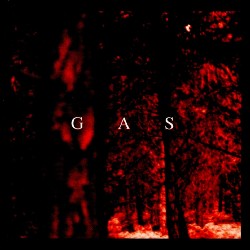
I mentioned last year that Konigsforst and above all the rolling, somber majesty of "Funf"--track five and properly speaking untitled before we all started playing CDs in on our computers and getting the tracklist read-out--was my most played music of 2007. Dug it out for some reason; just couldn't stop playing it. So I was both freaked and thrilled to learn that in May this year Wolfgang Voigt is putting out the four Gas albums--originally released via Mille Plateaux between 1996 and 2000--as a box set on Kompakt, with a parallel book of photographs + cd of unreleased music. I've got a piece upcoming in Frieze on this mighty music (macro-house? heroisch house?) but for now let me say this music is more than up to withstanding the monumentalism of the box format. For the ages.

No comments:
Post a Comment
Comment away